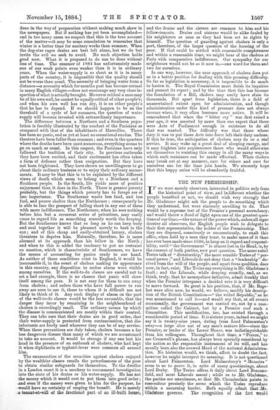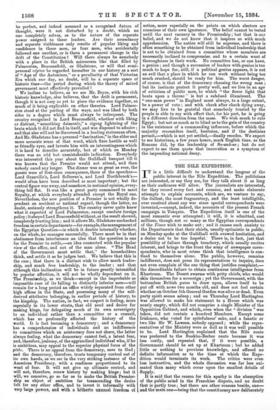THE NEW PREMIERSHIP.
IF we were merely observers, interested in politics only from the historical point of view, and indifferent .whether the people benefited or not, we should wish very strongly that Mr. Gladstone might ask the people to do something which they understood, but were sincerely unwilling to do. That would be a supreme test of the Premier's personal ascendancy, and would throw a flood of light upon one of the greatest ques- tions of our time,—the nature of the power which, unless all signs deceive all observers, the English people wish to delegate to their first representative, the holder of the Premiership. That they are disposed, consciously or unconsciously, to exalt this office, when held by a man they trust, to make more of it than has ever been made since 1688, to heap on it regard and responsi- bility, until "the Government" is almost lost in its Head, is,. by the consent of both parties, now past question. The more rabid Tories talk of dictatorship," the more sensible Tories of "per- sonal power ;" and Liberals do not deny that a "leadership ". de- rived from the will of the people, and apart from qualities, does now, in fact, exist. The Tories say everything is Mr. Gladstone's fault ; and the Liberals, while denying roundly, and, as we think, truly, that he monopolises initiative, admit frankly that when the Premier interposes a decided veto it is very difficult to move forward. So great is his position, that, if Mr. Bilge- hot were alive now, he would, we believe, modify his descrip- tion of the British Coustitution—" the veiled Bepublie,",sshe was accustomed to call it—and would sny that, at all events occasionally, the government was carried on, not -by a, com- mittee called the Cabinet, but by a Premier and such a Committee. This modification, too, has existed through a considerable period of time. It is sixteen-years, indeed.wemight say it is twenty-nine years, dating from Lord Palmerston's sway—a large slice out of any man's mature life—since the Premier, or leader of the Lower House, was indistbnuishable from his colleagues. Throughout that time, a "-Person," to use Cromwell's phrase, has always been specially cousidered.by the nation as the responsible instrument of its will, and has usually been also the avowed Head of the national Administra- tion. No historian would, we think, affect to doubt the fact, however he might interpret its meaning. It is not questioned about Lord Palmerston. Lord Malmesbnry's " Memoirs " seem to us to prove it, in spite of many questionings, about Lord Derby. The Tories affirm it daily about Lord Beacons- field, and most Liberals assent ; while as to .Mr. Gladstone, the parties are unanimous, so that Mr. Chamberlain pinta in rose-colour precisely the scene .which the Tories reprodnce within a mourning border. Both equally admit tIzat Gladstone governs. The recognition of the fact would
be perfect, and indeed assumed as a recognised datum of thought, were it not disturbed by a doubt, which no one completely solves, as to the nature of the separate power assigned to these leaders. Are their asoendancy and separate visibleness only results of popular liking and confidence in three men, or four men, who accidentally followed one another, or is there a permanent change in the drift of the Constitution? Will there always be somebody with a place in the British microcosm like that filled by Palmerston, Beaconsfield, or Gladstone, or will that semi- personal re'gime be regarded hereafter in our history as a sort of "Age of the Antonines," or a peculiarity of that Victorian Era which one day, no doubt, will be a separate space of historic time—the period during which the theory of mixed government most effectively prevailed ? We incline to believe, as we see Mr. Bryce, with his rich historic knowledge, also believes, that the drift is permanent, though it is not easy as yet to piece the evidence together, so much of it being explicable on other theories. Lord Palmer- ston stood at the parting of the ways, and was liked by both sides to a degree which must always be infrequent. The country recognised in Lord Beaconsfield, whether with liking Cr distrust, "something daimonic," a zigzag lightning of the brain which it did not find in itself, and was disposed to admire ; and that also will not be discovered in a leading statesman often.
And Mr. Gladstone has a personal "fascination," in the elder and more accurate sense of that word, which fixes hostile as well as friendly eyes, and invests him with an interestingness which it is hard to describe accurately, but of which on Monday there was an odd but unmistakeable indication. Everybody was interested this year about the Guildhall banquet till it was known that the Premier would not attend, and then nobody cared any longer. The dinner was as great as ever, the guests were of first-class consequence, three of the speeches— Lord Granville's, Lord Selborne's, and Lord Northbrook's- would often have been described as most important ; but the central figure was away, and somehow, in national opinion, every- thing fell fiat. It was like a great party summoned to meet Royalty, at which everybody attended except the Royal one. Nevertheless, the new position of a Premier is not wholly de- pendent on accident or national regard, though the latter, no doubt, seriously strengthens it. The country never quite knew what it expected of Lord Palmerston, except resolute foreign policy; it obeyed Lord Beaconsfield without, as the result showed, completely trusting him ; and it allows Mr. Gladstone unchecked freedom in certain departments—for example, the management of the Egyptian Question—in which it doubts internally whether, on the whole, he manages successfully. There must be in that abstinence from interference an idea that the question is one for the Premier to settle,—an idea connected with the popular view of the office, and not of the man alone. "The Head of the Government must settle that," the householders think, and settle it as he judges best. We believe that this is the case ; that there is a distinct wish to allow much leader- ship, and much free leadership, to the leader ; and that although this inclination will be in future greatly intensified by popular affection, it will not be wholly dependent on it. The Premiership, as we think—except in the improbable or impossible case of its falling to distinctly inferior men—will remain for a long period an office widely separated from other high offices in the State, and possessing many of the self- derived attributes belonging, in earlier periods of history, to the kingship. The nation, in fact, we suspect is feeling, more especially in its lower strata, that old need and desire for making kings, for delegating much of its own sovereignty to an individual rather than a committee or a council, which has so profoundly affected the history of the world. It is fast becoming a democracy ; and a democracy has a comprehension of individuals and an indifference to committees which an aristocracy does not share, the latter always feeling, what the democracy cannot feel, a latent fear, and, therefore, jealousy, of the aggrandised individual who, if he is ambitious, may appeal to the superior physical force of the plebs. There is no appeal from the democracy, save to God ; and the democracy, therefore, trusts temporary control out of its own hands, as we see in the very striking instance of the American Presidency, with a readiness proportioned to its want of fear. It will not give up ultimate control, and will not, therefore, renew history by making kings ; but it will, we conceive, go so far as to make the British Premier- ship an object of ambition far transcending the desire felt for any other office, and to invest it informally with very large powers, and with a hitherto unusual freedom of action, more especially on the points on which electors are conscious of their own ignorance. The belief cannot be tested until the next vacancy in the Premiership ; but that is our belief, and we do not know that it inspires us with much apprehension. The nation will still be supreme, and there is often something to be obtained from individual leadership that is not to be obtained from a committee whose members are necessarily inclined to compromise, and to a certain want of thoroughness in their work. No committee has, or can have, a genius ; and though a succession of leaders with genius is too much to hope for, still, if a political genius appears, it is not an evil that a place in which he can work without being too much crushed, should be ready for him. The worst danger, of course, is that of the democracy choosing the wrong man ; but its instincts protect it pretty well, and we live in an age of criticism of public men, to which "the fierce light that beats upon a throne" is but a subdued illuminant. The "one-man power" in England must always, to a large extent, be a power of veto ; and with check after check dying away, we may live to be grateful that somebody trusted by the people is able to say with effect that, for his part, he is going in a different direction from the mass. We wish much to rule Egypt ; but not so much as to blind us to the gain of the country in the existence of a commanding influence, before which the majority reconsiders itself, hesitates, and if the destinies permit,—which is not yet settled,—finally recedes. We expect to see historians, a few years hence, mark English time, as the Romans did, by the leadership of So-and-so ; but do not expect to see them quote that innovation as a symptom of the impending national decay.



































 Previous page
Previous page